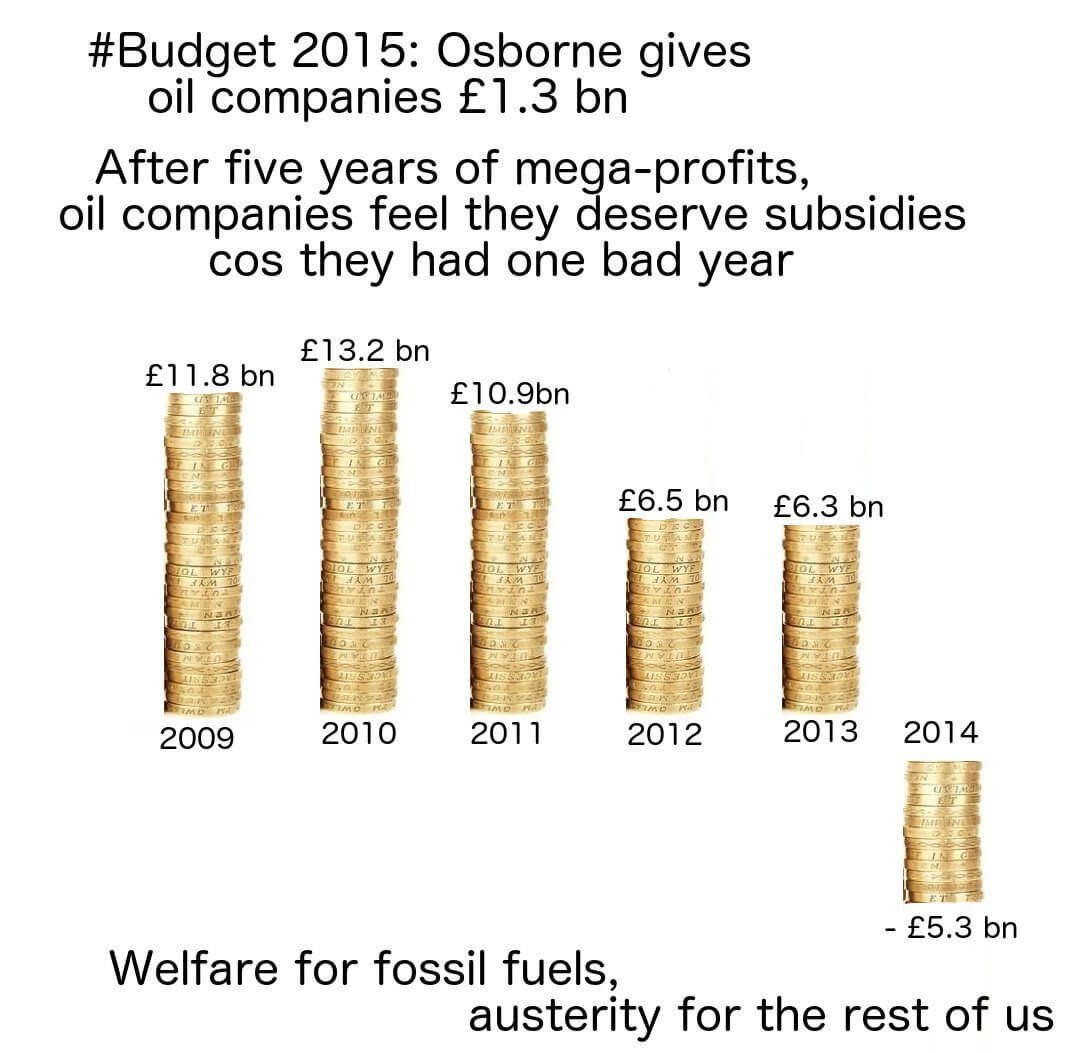This blog was written jointly with Greg Muttitt of Oil Change International
Today, Osborne announced massive tax breaks and subsidies for North Sea oil companies. A new £1.3 billion in subsidies will be handed to oil companies, with the burden transferred to the public. £1.3 billion could cover the costs of employing another 20,000 nurses in the NHS.
 In austerity Britain, there are plenty of people who are genuinely suffering. But oil corporations are not – as new research by Oil Change International and Platform shows.
In austerity Britain, there are plenty of people who are genuinely suffering. But oil corporations are not – as new research by Oil Change International and Platform shows.
The analysis of government statistics on profitability shows that, between 2008 and 2014, when the oil price was high, oil companies in the UK North Sea achieved an eye-watering 33% rate of return. Companies in other sectors – excluding banks – averaged 10% over the same period.
A sensible approach might be to put some of this excess profit away for a rainy day: everyone knows the oil price is cyclical.
Instead oil lobbyists conveniently forget that windfall: they point out that the industry received £5.8 billion ($9.2 bn) less than it spent in 2014. Official statistics are not yet available, so that figure can’t be checked. But assuming it’s correct, we found that between April 2009 and March 2014, companies netted £47.3 billion ($74.7 bn) in free cash flow, or £9.5 billion ($15 bn) per year – more than enough to offset any recent loss.
 So in reality, it’s not about survival: it’s about using public money to sustain enormous rates of profit.
So in reality, it’s not about survival: it’s about using public money to sustain enormous rates of profit.
Less than two months before an election, this would seem a great opportunity for the opposition. Austerity, climate change – the government should not put money into a wealthy and dirty industry.
But instead, UK politicians have been falling over themselves in a generosity competition towards the oil industry. Sadly, Labour and the Scottish Nationalist Party have instead demanded that Osborne should do more.
Politicians’ sympathy for oil is rationalised in terms of jobs, contributions to the economy and energy security. But the industry employs just 0.1% of the workforce. Even at its peak, it provided less than 2% of government revenue, and with lower oil prices it’s less than 1%. And as for energy security, oil is traded on global markets: UK-produced oil does not stay in the UK. [3]
Furthermore, the answer to fears about those 40,000 jobs would be for companies to accept a normal rate of profit rather than demanding an excessive one.
Osborne did as the industry demanded, cutting the Supplementary Charge from 30% to 20%. This is the only tax oil companies pay on any fields developed after 1993, apart from Corporation Tax. They also want him to increase tax breaks, including for exploration.
The industry were already getting up to £760 million ($1.2 billion) in tax breaks, as research by Oil Change International and the Overseas Development Institute found in November. These breaks – which could instead cover the salaries of an additional 15,000 nurses – fit the UK government’s definition of fossil fuel subsidies.
At the New York climate summit in September, David Cameron called for “fighting against the economically and environmentally perverse fossil fuel subsidies, which distort free markets and rip off taxpayers.” Perhaps he should start the fight closer to home.